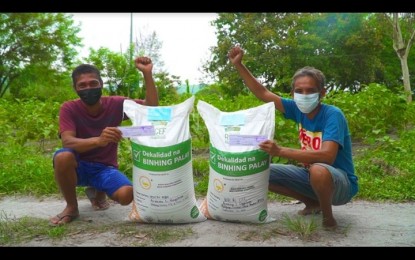
HOPE FOR FARMERS. Nestor Gido (left) and Cristito Acheta (right) from San Marcelino town, Zambales province are among the farmers who have benefited from the Rice Competitiveness Enhancement Fund (RCEF) Seed Program. They said their yields significantly increased as a result of using the certified seeds they received from the program. (Photo courtesy of DA-PhilRice)
SCIENCE CITY OF MUÑOZ, Nueva Ecija – Farmers in the province of Zambales are now reaping the fruits as beneficiaries of the Rice Competitiveness Enhancement Fund (RCEF) Seed Program.
Cristito Ancheta, a 44-year-old farmer from San Marcelino town, said his yields doubled as a result of using the certified seeds he received from the program.
He said his harvest jumped from three tons per hectare to six tons per hectare.
“I sold half of it and earned a gross income of around PHP50,000. I have never held such a huge amount of money before,” Ancheta said in a statement on Wednesday.
Nestor Gido, a farmer from the Aeta community of San Marcelino, said he regained hope in rice farming when he received support from RCEF and from his fellow farmers.
Gido said he has been farming for many years and the result was not often promising.
“I almost gave up when landslides destroyed all our crops. My farmer-neighbors told me to join their association. That opened the opportunity for me to know about RCEF,” he said.
“I remember my hands trembling when I first signed the form for the seeds. After planting the seeds, my yield increased, and so were my hopes for my family and my children’s future,” he added.
A total of 160 Aeta farmers in San Marcelino have received seeds from RCEF.
Meanwhile, the Department of Agriculture–Philippine Rice Research (DA-PhilRice) is now ready to distribute 4.27 million bags (20 kilograms/bag) of certified inbred rice seeds, expanding its program coverage from 42 to 77 provinces within all rice-producing regions in the country.
Jointly funded by the RCEF Seed Program and the DA’s National Rice Program (NRP) with PHP3 billion and PHP700,000, respectively, the certified inbred rice seed distribution is intended to complement and supplement the hybrid rice production strategy of President Ferdinand Marcos Jr. under his food security agenda.
Dr. Flordeliza Bordey, director of the RCEF Program Management Office at DA-PhilRice, said the allocation can plant 1.97 million hectares in 1,319 cities and municipalities nationwide covering the 2023 wet – 2024 dry cropping season.
“Through the integrated the efforts of RCEF Seed Program and the DA-NRP’s inbred seed strategy, we are expecting to serve 1.69 million farmers starting March 16," she said.
Previously, the RCEF Seed Program distributed more than 11.7 million bags of certified inbred seeds in 42 provinces since its first implementation in the 2020 dry season.
The RCEF Seed Program is a component of Republic Act 11203 or Rice Tariffication Law, which allocates PHP3 billion in funds every year to develop, propagate and promote high-quality inbred rice seeds to help improve the competitiveness of Filipino rice farmers. (PNA)
